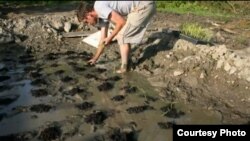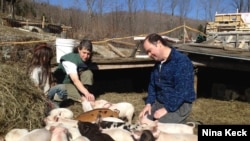Josh Brill and Meadow Squire grow vegetables and rice in Tinmouth, Vermont.
They wanted to expand their rice production last fall, but lacked the needed funds to do it. So they posted a six-minute video on Kickstarter, a crowd-sourced funding website. Seventy-six people thought enough of the couple’s dream to send them money. Brill and Squire raised over $6,000.
Thousands of Americans use Kickstarter to raise money for specific projects. The site launched in 2009 primarily to help artists and musicians but today, inventors, entrepreneurs and a growing number of farmers are also using the site.
Scott Nelson of Friendly Folk Farm in Brookfield, Vermont, is one of them. He wanted to document the growth and development of his farm - to create a kind of how-to video for others interested in organic farming. He raised nearly $9,000 on Kickstarter.
To raise money on Kickstarter, you have to have a specific, creative project in mind - one approved by the website. Many entrepreneurs, like Brill and Squire, include a video to explain what their project is and why people should support it. There’s also a deadline for raising the cash - typically about 30 days.
To entice people to pledge, projects also include a list of thank you gifts for various levels of support. Brill and Squire gave supporters packs of seeds, rice they’d harvested, and good karma points.
“Yeah," Squire says with a laugh. "Everyone needs more Karma, I think.”
If a project meets its funding goal in time, Kickstarter takes five percent of the proceeds while Amazon takes another three-to-five percent for credit card processing fees.
Forty-five hundred creative projects are currently seeking money on Kickstarter. Officials at the site say they don’t track farm-related projects, but with $3 million being pledged each week, it’s not surprising that farmers want in.
Walter and Holly Jeffries own Sugar Mountain Farm - a 28 hectare spread in West Topsham, Vermont, where they're raising 300 pigs. They’ve been in business since 2003 and have a loyal clientele for their pork. Because commercial slaughtering and butchering facilities are in short supply in Vermont, Holly has to drive to a meat processor 240 kilometers away.
“My wife drives down to Massachusetts and it’s a seven-hour trip every week," Walter says. “It’s a long drive, it’s a lot of gasoline and it’s a lot of time.”
And because the van can only carry six pigs per trip, it limits the amount of pork the couple can sell.
“We actually calculated that between the time of loading the pigs and driving down and spending the time sorting our orders that the butcher has done for us and beginning deliveries," Holly says. "In that same amount of time, we could slaughter and cut the pigs ourselves.”
So, they thought, why not build their own government inspected butcher shop right on their farm?
Financing from banks was hard to get in 2008, however, as the recession was just beginning. But with loans from friends and family and their own savings, the Jeffries managed to get quite a bit of their butcher shop built - but not all of it.
“In the spring some customer suggested why don’t you try Kickstarter?" Walter says. "This was in 2010.”
But back then, Kickstarter was still primarily geared to artists and musicians and the website turned their butcher shop proposal down.
“This winter another customer said, 'Hey, there’s a project on Kickstarter that’s just like yours.' In fact, it turned out that the project that was inspired by ours," Walter says. "These were farmers down in Pennsylvania and they had been inspired to farm the way we do by reading my blog for years.”
That was North Mountain Pastures in Pennsylvania, which raised $48,000 this winter to build a small-scale meat curing facility on their farm. When the Jeffries saw that project on Kickstarter, they approached the website again.
This time, they were approved and raised more than $33,000.
"Kickstarter is a platform," says Holly, "but it’s really a matter of us getting the word out, letting people know it’s there."
Which may be why more and more farmers are successfully raising money on crowd sourced funding sites like Kickstarter.
That brings us back to our rice farmers in Tinmouth. While Meadow Squire checks on a pair of baby goats, her partner Josh Brill walks across the mud to point out new rice paddies they put in with funds from Kickstarter.
“One of the key things that Kickstarter allowed us to do was reach out," Brill says, "having the video online and being able to link with Facebook.”
“It really was free advertising for us," Squire adds, "and there’s already so much anticipation about the rice coming that we would not have had if we just had gotten a loan from a bank.”
The couple hopes that buzz will help boost sales this year. And they say the feedback has been really inspiring, especially from other farmers.
Brill says one pledge came all the way from New Zealand. “When someone is willing to put up their money for your farm, that means something. It’s like you would feel bad if you couldn’t succeed for them.”
He’s not sure, but Brill doubts he’d feel quite as emotional about a bank loan.
They wanted to expand their rice production last fall, but lacked the needed funds to do it. So they posted a six-minute video on Kickstarter, a crowd-sourced funding website. Seventy-six people thought enough of the couple’s dream to send them money. Brill and Squire raised over $6,000.
Thousands of Americans use Kickstarter to raise money for specific projects. The site launched in 2009 primarily to help artists and musicians but today, inventors, entrepreneurs and a growing number of farmers are also using the site.
Scott Nelson of Friendly Folk Farm in Brookfield, Vermont, is one of them. He wanted to document the growth and development of his farm - to create a kind of how-to video for others interested in organic farming. He raised nearly $9,000 on Kickstarter.
To raise money on Kickstarter, you have to have a specific, creative project in mind - one approved by the website. Many entrepreneurs, like Brill and Squire, include a video to explain what their project is and why people should support it. There’s also a deadline for raising the cash - typically about 30 days.
To entice people to pledge, projects also include a list of thank you gifts for various levels of support. Brill and Squire gave supporters packs of seeds, rice they’d harvested, and good karma points.
“Yeah," Squire says with a laugh. "Everyone needs more Karma, I think.”
If a project meets its funding goal in time, Kickstarter takes five percent of the proceeds while Amazon takes another three-to-five percent for credit card processing fees.
Forty-five hundred creative projects are currently seeking money on Kickstarter. Officials at the site say they don’t track farm-related projects, but with $3 million being pledged each week, it’s not surprising that farmers want in.
Walter and Holly Jeffries own Sugar Mountain Farm - a 28 hectare spread in West Topsham, Vermont, where they're raising 300 pigs. They’ve been in business since 2003 and have a loyal clientele for their pork. Because commercial slaughtering and butchering facilities are in short supply in Vermont, Holly has to drive to a meat processor 240 kilometers away.
“My wife drives down to Massachusetts and it’s a seven-hour trip every week," Walter says. “It’s a long drive, it’s a lot of gasoline and it’s a lot of time.”
And because the van can only carry six pigs per trip, it limits the amount of pork the couple can sell.
“We actually calculated that between the time of loading the pigs and driving down and spending the time sorting our orders that the butcher has done for us and beginning deliveries," Holly says. "In that same amount of time, we could slaughter and cut the pigs ourselves.”
So, they thought, why not build their own government inspected butcher shop right on their farm?
Financing from banks was hard to get in 2008, however, as the recession was just beginning. But with loans from friends and family and their own savings, the Jeffries managed to get quite a bit of their butcher shop built - but not all of it.
“In the spring some customer suggested why don’t you try Kickstarter?" Walter says. "This was in 2010.”
But back then, Kickstarter was still primarily geared to artists and musicians and the website turned their butcher shop proposal down.
“This winter another customer said, 'Hey, there’s a project on Kickstarter that’s just like yours.' In fact, it turned out that the project that was inspired by ours," Walter says. "These were farmers down in Pennsylvania and they had been inspired to farm the way we do by reading my blog for years.”
That was North Mountain Pastures in Pennsylvania, which raised $48,000 this winter to build a small-scale meat curing facility on their farm. When the Jeffries saw that project on Kickstarter, they approached the website again.
This time, they were approved and raised more than $33,000.
"Kickstarter is a platform," says Holly, "but it’s really a matter of us getting the word out, letting people know it’s there."
Which may be why more and more farmers are successfully raising money on crowd sourced funding sites like Kickstarter.
That brings us back to our rice farmers in Tinmouth. While Meadow Squire checks on a pair of baby goats, her partner Josh Brill walks across the mud to point out new rice paddies they put in with funds from Kickstarter.
“One of the key things that Kickstarter allowed us to do was reach out," Brill says, "having the video online and being able to link with Facebook.”
“It really was free advertising for us," Squire adds, "and there’s already so much anticipation about the rice coming that we would not have had if we just had gotten a loan from a bank.”
The couple hopes that buzz will help boost sales this year. And they say the feedback has been really inspiring, especially from other farmers.
Brill says one pledge came all the way from New Zealand. “When someone is willing to put up their money for your farm, that means something. It’s like you would feel bad if you couldn’t succeed for them.”
He’s not sure, but Brill doubts he’d feel quite as emotional about a bank loan.










